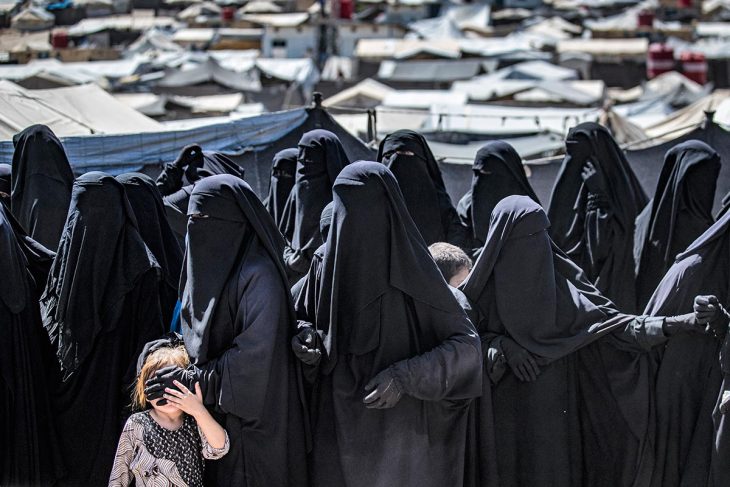On October 25, the Higher Regional Court of Munich sentenced Jennifer W. to a prison sentence of 10 years for her involvement in the enslavement, abuse and killing of a five-year-old Yazidi girl as well as enslavement and abuse of the child’s mother in Iraq. The Office of the German Federal Public Prosecutor had asked for a life sentence.
Jennifer W.’s was the first indictment and longest trial against a female IS member of German nationality on charges of international crimes committed against the Yazidi community. Hers is the fifth conviction of a female IS member tried in Germany for the atrocities committed against Yazidis.
While these trials denote a considerable evolution in the German jurisprudence on IS-affiliated women – with both crimes against humanity and war crimes playing an increasingly important role –, stereotypes employed by all sides reflect and perpetuate binary, gendered ideas about the involvement, motives and intent of female IS members in mass atrocities. For (international) criminal justice to live up to its ideals of contributing to an accurate historical record and to deliver justice for victim communities, it is paramount for such gendered notions to be overcome.
Prosecution of female IS-returnees
When Sibel H. landed in Frankfurt am Main in early 2018, the German Federal Prosecutor sought to charge her with membership in a terrorist organization abroad. Yet, Germany’s Federal Court held shortly afterwards that merely living in IS-territory and engaging in what can be considered ‘normal’ household work was insufficient to indict her on terrorism charges. Then it took over a year until the first German woman returning from the so-called ‘caliphate’, Sabine S., was convicted in July 2019 by the Higher Regional Court of Stuttgart. For inhabiting a seized property, i.e. pillaging, and promoting IS propaganda online, she received a prison sentence of five years. Since then, other women have been found guilty of a variety of international crimes – among them Sibel H., who ultimately received a sentence of three years. Carla-Josephine S., for instance, was convicted for the war crime of enlisting a child under 15, her son who was six years old at the time, into an armed group.
Moreover, Germany made international headlines as “leading the way in prosecuting ISIS members for specific crimes committed against Yazidis”. Besides the lawsuit against Jennifer W.’s husband Tahal al J., who is charged with genocide, all of the defendants were female. Specifically, during the two and a half years that Jennifer W. stood trial, no less than four judgments were being passed - all on aiding and abetting enslavement as a crime against humanity.
Sarah O., a 23-year German and Algerian national who joined IS as a minor, was convicted in July 2021. In a first, she was found to have committed the crime of “persecution on intersecting religious and gender grounds” through rape and enslavement. The other concluded cases are connected to her case as both 30-year-old Omaima A. and 35-year-old Nurten J. were found guilty of aiding and abetting crimes against humanity because they had received Yazidi women ‘owned’ as slaves by Sarah O. Nurten J. was sentenced to four years and three months in April 2021, while Omaima A., who had been found guilty of membership in a terrorist organization in a previous trial, received an accumulated sentence of four years.
When prosecutorial strategies reflect stereotypes
There is a multiplicity of fluid roles that these women occupied as IS members. Whereas the initial investigations and phases of the trials predominantly focused on the religious motives and intent of IS perpetrators, IS gender ideology was left unattended.
Upon examination of the language in the indictments against female IS perpetrators, it initially had been around religious ideology justifying their criminal conduct and involvement. While this is certainly true, it does not paint the entire picture, namely that it is both the religious and gender ideology of IS that has influenced and has a relationship to the criminal conduct of perpetrators. Respectively, this relationship vis-a-vis the involvement of all perpetrators (female and male) in said conduct needs to be adequately investigated, legally categorised and prosecuted.
A promising development in that regard is the verdict against Sarah O., who was, as stated above, convicted for the crime against humanity of persecution on intersecting religious and gender grounds through rape and enslavement. It however remains unclear as to what extent such a gender-competent analysis was employed from the beginning of the investigations. This is crucial because it brings to light not only gendered harms and dimensions in relation to international crimes but reveals information about power relations as well as exercise of supremacy and dominance among victim and perpetrator groups.
From the perspective of the prosecution, it is certainly common that new information and evidence comes to surface in the course of the proceedings, including additional victims and witnesses, which in turn leads to an expansion of the original charges. Yet, the information and evidence of intersecting gender and religious based persecution should have formed an inherent part of the structural investigations since the beginning in 2014, independently from the additional evidence gathered by civil society organizations, witnesses willing to testify and motions filed by victim’s counsel.
The instrumental role of women under IS
Intrinsic shortcomings following gendered, binary stereotypes include that exclusively females have been charged with crimes, international and national, with respect to their children and exclusively females have been charged with war crimes against property even when male members also inhabited the seized houses. Such a prosecutorial strategy affirms a gendered, narrow understanding of the role of women under IS limited to the private realm within the confines of motherhood, dutiful wife and caretaker. In reality the role of female members was and is in fact instrumental to the functioning of IS – in particular the system of enslavement. Moreover, as experts noted, the role of female IS members advanced and expanded with time. Crucially, it is the intent or motive that should be considered objectively in the context of international criminal investigations and prosecutions, not (solely) the agency of (female) perpetrators.
More broadly, there is a lack of cases reaching trial stage that demonstrate the full array of gendered violations of international criminal law against the Yazidi, including the crime of the slave trade and enslavement of Yazidi and various forms of sexual violence committed against women, girls, boys and LGBTQI persons. There is a lack of cases against high-level members of IS whose involvement and knowledge can reveal further information about the organizational and command structures of IS. Lastly, there is a lack of cases examining the genocidal intent of perpetrators beyond the Taha Al. J. case.
When defence strategies don’t help
Besides the often narrow focus of the investigative and prosecutorial strategies, gender stereotypes drawn on by defence teams also undermine an accurate understanding of the complex involvement of women in IS and its criminal conduct. Specifically, defence attorneys systematically situate their respective clients in the ‘private sphere’ to explain (away) their alleged crimes and involvement therein. While a unique, yet gendered story is offered in every case, broadly three general themes have been observed in negating any political motivations or ideological agency underlying these women’s (in)actions.
First, their decision to travel towards the so-called caliphate is often clothed in stereotypes. Sibel H., for instance, argued that she had fallen ‘head over heels’ for a man, who was already in Syria – leaving her with no choice but to follow her love. Similarly, Omaima A. depicted her journey to IS as an attempt to ‘save her marriage’ with the father of her third child, who was already in IS-territory. Carla-Josephine S., in turn, hoped to become the ‘perfect mother’ in the sense of her religion, by taking her children to a territory supposedly ‘ruled by Islam’. Coupled with the repeated assertion of innocence and naivety that they did not know what would await them in Syria, all these narratives suggest that these women did not join IS for any other reasons than ‘their husband or children’. This not only depoliticizes their decision to travel to the so-called caliphate but suggests that it is stereotypical feminine longings that ultimately brought them there.
Second, to account for their time in Syria, their behaviour is clothed in an equally high level of passivity, depicting them as mere wives and mothers. As wives, it is argued, they could not have taken the decisions that they are now being held accountable for. Throughout her trial, Jennifer W. argued that she could not have helped the five-year old Yazidi girl that her husband had chained to a window in the 50 degrees summer heat, for fear of being “shoved or locked up” by her husband. She and Omaima A. have also repeatedly accused the prosecution of putting them on trial for crimes committed by their husbands, or even IS more broadly. Early into Omaima A.’s first trial, for instance, her lawyer declared the prosecution sought to misrepresent her motherly care as support for IS terrorism. Faced with the choice between taking care of her children and thereby exposing herself to prosecution for membership in a terrorist organisation or disregarding her maternal duties, it was clear what a mother would opt for, he contended.
Third, the notion most frequently referred to is that of the women’s own ‘victimisation’. Already the first German woman convicted for her IS membership after returning, Sabine S., portrayed herself as a victim of her life circumstances. Similarly, Nurten J.’s testimony centred predominantly on the hardships she had to endure both while living under IS and when escaping Syria. Here, too, the pain that the women had to go through as mothers to children in a war zone is often emphasis ed. Carla-Josephine S.’s lawyers, for instance, argued that it was the suffering of her children, the fear for her son during his stays in an IS child soldier training camp as well as his ultimate death on their flight from Syria that were the greatest punishment on her. Finally, the separation from their children is also often described as an ongoing form of victimisation of these women – and a hardship, which ought to be considered as mitigating factors, regardless of the crimes they are charged with.
Such heteronormative depictions of women engaged in international crimes perpetuate binary ideas of the emotion vs rationality or victim vs perpetrator. It further encourages the continued focus on the private rather than the public sphere, i.e. in the house or towards their children. The distinction of such realms fails to recognise that the crimes committed in-house were part and parcel of an ideologically driven public campaign by IS against the Yazidi community. Ultimately, such narratives distort our view on the criminal conduct that took place under IS and undermine both our understanding of women’s complex involvement therein and justice for survivor communities.
Gender perceptions continue since Nuremberg
These perceptions of women as committing crimes in the shadows and influence of men or merely facilitating them in their independent acts can be traced back to the Nuremberg trial of Ilse Koch, wife of an SS officer in charge of the Buchenwald concentration camp. 75 years ago, Koch also played to her gender, using the defence of being a ‘completely normal and morally pure wife and a mother’ fulfilling her duties as an SS wife.
In 2001, Pauline Nyiramasuhuko, in her trial for conspiracy to commit genocide before the International Criminal Tribunal for Rwanda, also downplayed her role as that of a social worker wanting to help the women of Rwanda and saying that ‘women did not know how to massacre like the actual [male] genocidaires did.’ Finally, in the proceedings of the only woman indicted at the International Criminal Court to date, for electoral violence in Côte d'Ivoire, Simone Gbagbo also used the defence that she committed these acts under fear of her husband, then President Laurent Gbagbo, who would have physically hit her otherwise.
Additionally, a running similarity in both the historic case studies and German trial against female IS perpetrators is that these women perpetrators are piggybacked along a male criminal, be it Ilse Koch, Simone Gbabgo or Jennifer W. who are tried alongside their husbands or Pauline Nyiramasuhuko who was tried alongside her son. The role of women in commission of crimes is then often downplayed and excused as women donning a masculine identity to survive in a predominantly patriarchal society.
The increasing number of (repatriated) women returning from northeast Syria brings their role in IS mass violence to the forefront. This presents an opportunity to catapult the binary role of women as a bystander or victim towards recognising them as both direct and indirect agents as well as ideologically motivated supporters of criminal conduct - even and especially in the context of gender and religious ideologies that foresee defined roles, tasks and agencies of women. Concurrently, there are two joined cases before the European Court of Human Rights which will determine whether EU Member States have a ‘duty to repatriate’ (at least) their female and minor nationals from the camps in northeast Syria. An affirmative judgment would likely result in an increase in repatriations, and, by extension, prosecutions of female IS returnees. The role and involvement of women perpetuating systems of violence therefore should be sufficiently analysed to capture in the most nuanced and accurate way possible the entirety of crime patterns.

Alexandra Lily Kather, LLM, is a legal consultant on accountability for international crimes on the national level through universal jurisdiction. Her work contributed to investigations and prosecutions carried out under the principle of universal jurisdiction in Germany and other European countries in relation to crimes in Syria and crimes committed against the Yazidi in Iraq. She is currently a Visiting Fellow at Goldsmiths University London.

Niriksha Sanghvi is an international criminal and human rights lawyer specialising in accountability for atrocity crimes and business and human rights. She is part of a defence team at the UN International Residual Mechanism for Criminal Tribunals and is a legal advisor for Global Rights Compliance where she works on research and advocacy projects, including promoting accountability for starvation and corporate responsibility.

Carlotta Sallach is a communications consultant at the German Council on Foreign Relations. She has previously worked as a research consultant with the Counter Extremism Project Germany. Carlotta recently graduated from Utrecht University with an LLM in Public International Law and an MA in International Relations. Her research focuses on the nexus between gender and (political) violence as well as gender and the law.







